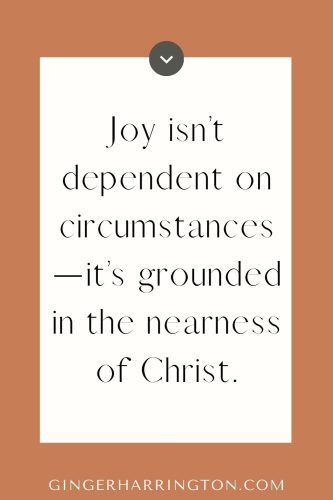Discover how to choose joy in hard times with Philippians 4:4–5. Learn the difference between joy and happiness, and practical ways to rejoice even when life is challenging.
What if joy isn’t something you have to chase? What if it’s something you choose—even when life feels overwhelming?
That’s the question at the heart of this first message in our Steady Heart Series on Philippians 4.
“Rejoice in the Lord always. I will say it again: Rejoice. Let your gentle spirit be known to all. The Lord is near.” — Philippians 4:4–5
Paul’s command to rejoice sounds simple until life is anything but joyful. Yet he insists this practice is possible because the Lord is near.
In this post, we’ll explore biblical joy vs. happiness. In reality, choosing joy is a spiritual decision, and it can become a habit that steadies your heart in every season. You’ll discover:
- Why the context of Philippians 4 makes Paul’s words so powerful
- What it means to anchor your joy in who God is, not what is happening
- How biblical joy is different from happiness—and why it’s not “toxic positivity”
- Real-life examples of learning to rejoice in hard seasons
- Practical ways to practice joy as a habit, not a mood
If you’ve ever struggled to feel joy when circumstances are heavy, this passage offers both a challenge and a promise: Joy doesn’t come from pretending everything is fine—it comes from remembering that the Lord is near.
Why is the Context of Joy in Philippians 4 so Powerful?

Before we get to Paul’s command to rejoice, it helps to notice the setting. Philippians 4 isn’t written in isolation—it’s a continuation of everything Paul has been teaching throughout the letter. He begins this chapter with words of affection: “My beloved brethren, whom I long to see, my joy and crown… stand firm in the Lord.”
This isn’t cold instruction. It’s family language. Paul is reminding us that joy is nurtured inside a relationship with God and His people.
It’s also crucial to remember where Paul was writing from. These aren’t the words of a man lounging in comfort. They are the words of a prisoner in a Roman cell. And yet, it is from this place of hardship that Paul insists: “Rejoice in the Lord always.”
That’s what makes this passage so powerful. Joy here isn’t dependent on ease or convenience. It’s not the result of happy circumstances. It’s the fruit of knowing Christ’s presence—especially in our hard times.
Why Does Paul Command, “Rejoice in the Lord Always”?
When Paul writes “Rejoice in the Lord always. I will say it again: Rejoice,” he isn’t offering a suggestion or a motivational slogan. The language is a command, an imperative. Rejoicing isn’t optional for the believer—it’s central to the Christian life.
That can feel overwhelming. How can you rejoice when your heart is anxious or your circumstances are painful?
It helps to notice what Paul doesn’t say. He doesn’t tell us to rejoice in our circumstances or because everything feels good. He points us to a Person: “Rejoice in the Lord.”
The word rejoice in Greek carries the sense of being calmly glad, thriving, even being well. It’s not a passive feeling that drifts in on good days; it’s an intentional practice. Joy, in Scripture, is a verb before it is an emotion.
Charles Spurgeon once observed how extraordinary it is that God commands us to be happy in Him. Most of us have heard teachers or parents say, “Be quiet” or “Get your work done.” Rarely do we hear anyone insist, “Be joyful today.” Yet that is exactly what Paul does here. And he repeats it for emphasis: “I’ll say it again: Rejoice.”
How Does “The Lord Is Near” Change Everything?
Tucked right after Paul’s command to rejoice is a phrase that explains why joy is possible: “The Lord is near.” Those four words are the anchor for everything that follows in Philippians 4.
When life feels overwhelming, it’s easy to believe joy is out of reach. But Paul reminds us that joy doesn’t come from improved circumstances—it comes from the unchanging nearness of Christ. Nearness is the reason we can rejoice, the reason we can pray with confidence, and the reason peace can guard our hearts.
Feelings come and go—sometimes God may not feel close. Yet the reality of His presence is not dictated by our emotions. Scripture assures us that He is at hand, always with His people. Learning to rejoice, then, means reminding ourselves of what is true, even when it doesn’t feel true.
Rejoicing isn’t pretending everything is fine. It’s practicing the presence of a near God. That nearness changes everything.
What’s the Difference Between Biblical Joy and Happiness?
It’s easy to confuse joy with happiness, but Paul’s frequent reference to joy throughout the book of Philippians point us to something deeper than emotion.
Happiness depends on circumstances. It rises and falls with outcomes—a good day at work, a kind word from a friend, or an accomplishment you’ve been waiting for. Happiness is wonderful, but it’s fleeting—here one moment and gone the next.
Joy, however, is an intentional choice rooted in faith. We rejoice not because everything feels good, but because the Lord is present. Joy can coexist with tears, grief, or uncertainty, because it rests on who God is rather than what is happening.
This distinction matters. When life is painful, the call to rejoice is a sacred invitation to place your confidence in the One who is present with you through every circumstance.

Isn’t Choosing Joy Just “Toxic Positivity”?
At first glance, “Rejoice in the Lord always” can sound like Paul is telling us to ignore reality and paste on a smile. In today’s terms, that’s what many call toxic positivity—the idea that every situation should be met with a shallow optimism that dismisses pain.
As my co-host Larissa shared, phrases like “everything happens for a reason” or “just stay positive” can feel like nails on a chalkboard to someone who is grieving. They minimize suffering rather than offering comfort.
But Paul isn’t writing from comfort; he’s writing from a prison cell. His call to rejoice doesn’t gloss over hardship—he’s living it. What makes his words so powerful is that they point beyond circumstances to Christ Himself.
Toxic positivity says: “Just look on the bright side.”
Biblical joy says: “The Lord is near, and His presence is enough—even here.”
Joy doesn’t silence grief. It allows us to be honest about pain while holding fast to God’s nearness. It’s faith that God is with you, even when life hurts.
How Can You Practice Joy as a Habit, Not a Mood?
Joy isn’t automatic. Left to ourselves, most of us drift toward worry, frustration, or discouragement. That’s why Paul repeats the command to rejoice—it’s something we learn to practice until it becomes a steady rhythm of faith.
Think of joy as a spiritual muscle. Strength grows through repetition at the gym, and joy grows in the same way. Each choice to rejoice adds up, shaping our perspective and training our hearts to notice God’s presence.

9 Simple Ways to Practice Choosing Joy
1) Pray the small prayer God loves to answer
“Lord, help me choose joy—for the next five minutes.” Nearness means help is present.
2) Begin your day declaring a Bible verse
In a podcast, John Ortberg shared how he often begins the day declaring Psalm 118:24:
“This is the day the Lord has made; I will rejoice and be glad in it.” John’s simple idea has inspired me to frequently begin my day with this simple habit. It is a way of choosing joy, gratitude, and gladness in God as we start the day.
3) Set an alarm with worship
Larissa sets her alarm to a variety of worship songs that inspire joy so the cue stays fresh.
4) Start a Joy List on your phone
Title it with truth, e.g., “God’s goodness and mercy follow me” (Psalm 23:6). Add small examples of grace through the day.
5) Practice the “I get to” reframing
- Larissa: “I get to wrangle a stubborn bulldog.”
- Ginger: “I get to work out.” After watching my sister lose mobility to ALS, movement feels like a privilege, not a punishment.
6) Keep a single-word reminder in your journal
Larissa writes JOY as a faith statement, not a feeling.
7) Use joy verses to steady your thoughts
- Psalm 16:11: “You will show me the way of life, granting me the joy of Your presence…”
- John 15:11: “I have told you this so that My joy may be in you and that your joy may be complete.”
8) Engage your body
Step outside into light. Breathe slowly. Put on a worship playlist and sing along.
9) Ask this question each morning
“Lord, what could rejoicing look like today?” Then keep your eyes and ear open throughout the day.

Real joy often starts small—but each small choice strengthens your heart to rejoice again.
Which one of these ideas resonates with you most today? Which could open the door to more joy in your life?
Choosing Joy Today
Rejoicing doesn’t always come naturally—especially in seasons of loss, stress, or fear. But Philippians 4:4–5 reminds us that joy is not out of reach. It is a command rooted in the unshakable truth that the Lord is near.
Joy doesn’t erase pain or pressure, but it reframes them in light of God’s presence. Whether through prayer, Scripture, music, journaling, or simple reframing—each choice to rejoice opens the door for His strength to steady your heart.
So when life feels heavy, whisper to yourself: Rejoice anyway. Not because everything is okay, but because God is still good and Jesus is near. Joy doesn’t change your circumstances, but it changes you.
Coming Next in the Series
This is just the beginning of our journey through Philippians 4. In the next post, we’ll look at how prayer can interrupt anxiety and how gratitude shifts our perspective when fear and pressure weigh us down.
FAQ
What’s the difference between happiness and joy?
Happiness rises and falls with circumstances; joy is rooted in Christ and available by the Spirit, even on hard days.
Is this “toxic positivity”?
No. Biblical joy never dismisses pain. It names pain honestly and remembers God’s presence in it.
How do I start if I feel numb?
Borrow words. Pray scripture, play a song, or write JOY as a one-word prayer. Ask: “Lord, help me choose joy—for five minutes.”
Author Bio
Ginger Harrington is the author of Holy in the Moment: Simple Ways to Love God and Enjoy Your Life, and host of the Habits of Hope Podcast. With warmth and practical wisdom, she encourages women to cultivate hope and a deeper life in Christ for heart and home. Through writing, speaking, and resources like the Steady Heart Series, Ginger helps readers discover rhythms of faith that steady the soul in anxious times.
The Steady Heart Series
-
- Part 1:How to Choose Joy in Hard Times: A Study of Philippians 4:4-5
- Part 2: How to Shift from Anxiety to Peace: A Study of Philippians 4:6
- Part 3: How to Find God’s Peace That Guards Your Heart: A Study of Philippians 4:7
- Part 4: How to Filter Your Thoughts and Find Peace: A Study of Philippians 4:8-9
Recent Content

 So glad you're here. I help busy women—gals like you— build healthy habits for living well with biblical wisdom and practical steps to deepen your faith, increase your hope, and thrive in your purpose.
So glad you're here. I help busy women—gals like you— build healthy habits for living well with biblical wisdom and practical steps to deepen your faith, increase your hope, and thrive in your purpose.




Thank you so much! God bless you.
Blessings to you as well, Lyndi! So glad this content encouraged you today!
Hi Lyndi, I’m glad this post encouraged you. Thanks so much for your kind comment! May God bless you in a special way as you entrust your life to him!
Hi, Ginger
(Philippians 4 :4 ) states:
‘Rejoice in the Lord alway: & again I say, Rejoice.’
The verse is propounded nicely in this article.
The following verses denote : the ways, that we can delight in the Lord _:
###########
1) ‘By keeping The LORD always before us.
(Psalm 16: 8,9 ) says :’I have set the LORD always before me:
Therefore my heart is glad. ‘
2) Delight in His statutes, i. e. in His ways (commandments,Law ).
These are 5 consistent Verses
i) (Psalm 119:16) states : ‘I will delight myself in thy statutes: I will not forget thy word.’
!!) (Psa. 112 :1) states : ‘Blessed is the man, that delighteth greatly in His commandments.’
!!!) (Isaiah 58: 2) states :“They seek me daily & delight to know my ways. ”
iv) (Psalm 119: 35) states :” Lead me in the path of your command ments, for I delight in it”.
v) (Psalm 1: 2 ) says :’ Blessed is the man whose delight is in the law of the Lord. ‘
3) Delight by putting trust in Him & loving His name.
(Psalm 5:11) says,’ Let all those that put their trust in thee rejoice: let them ever shout for joy, because thou defendest them: let them also that love thy name be joyful in thee.’
4) Delight in the Sabbath.
(Isaiah 58: 13,14) states :“If you call the Sabbath a delight & the holy day of the Lord honorable; if you honor it, not going your own ways, or seeking your own pleasure, or talking idly; then you shall take delight in the Lord.’
5) Delight in His fear.
(Psalm 119: 74)says:’They that fear thee will be glad. ”
6) Delight in hope.
(Romans 5:1-2) says :’By Lord Jesus Christ, we have access by faith into this grace wherein we stand, & rejoice in hope of the glory of God ‘
7) ln the salvation.
(Psalm 9 :14)says, ‘I will rejoice in Thy salvation.’
8) (1 Peter 4:12,13)says: ‘Rejoice, inasmuch as ye are partakers of Christ’s sufferings.’
9) Rejoice in temptations of life.’
(James 1: 2 ) says:’ My brethren, count it all joy when ye fall into divers temptations. ‘
10) Rejoice in persecutions.
(Matthew 5 :12)says:’ Rejoice, & be exceeding glad: for great is your reward in heaven: for so persecuted they the prophets which were before you ‘.
11) Rejoice in sorrow.
(2 Corinthians 6:10 )says :’ As sorrowful, yet always rejoicing ‘.
And,
12) Rejoice in barrenness.
(Galatians 4: 27 )says :’ For it is written, Rejoice, thou barren that bearest not. ‘
( Psalm 34 : 2) says :’ Humble becomes glad in The Lord.’
Jesus prayed, “Thy will be done in earth, as it is in heaven.”
( Matthew 6: 10)
But God will give the desires of man ‘s heart.’
Hi Usha, I’m so glad you enjoyed this content. Wow-this is a really great list of verses that adds so much to the post. Thank you for taking time to join the conversation in such a meaningful way. Blessings to you!